17. September 2000 10:58
by Rene Pallesen
0 Comments
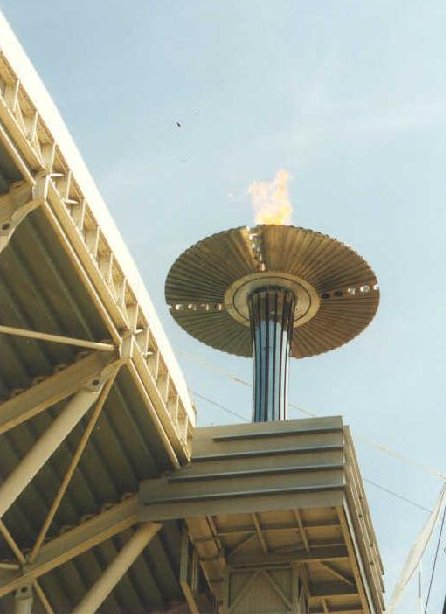 Last September, Sydney held the Olympic Games. I saw a lot of the events on TV but was disappointed with the coverage of other countries' involvement.
However, I did manage to be at Olympic Park during the Games and also see the first handball match - Denmark vs Norway.
I managed to get tickets for the game and had a very nice day with my girlfriend and the Lenehans. I also managed to get some pretty spectacular photos of the Olympic torch.
Last September, Sydney held the Olympic Games. I saw a lot of the events on TV but was disappointed with the coverage of other countries' involvement.
However, I did manage to be at Olympic Park during the Games and also see the first handball match - Denmark vs Norway.
I managed to get tickets for the game and had a very nice day with my girlfriend and the Lenehans. I also managed to get some pretty spectacular photos of the Olympic torch.
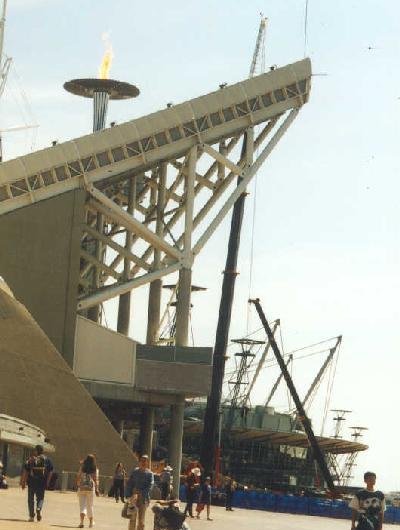
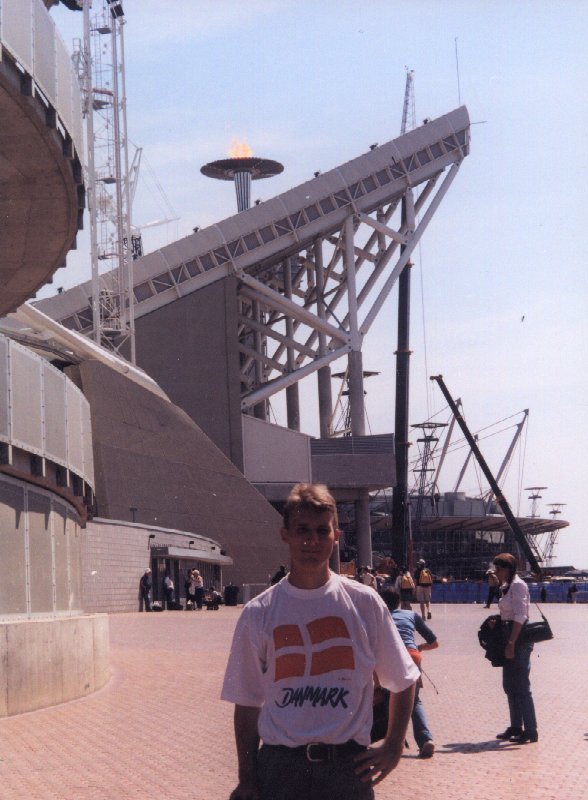
Here is Stadium Australia, where the Olympic torch is held. Most of the major track & field events, as well as athletics were held here. It is a pretty spectacular building - and HUGE. During the Olympics, you could not go into just any of the buildings at Olympic Park. You had to have a ticket for an event before you could enter the building.
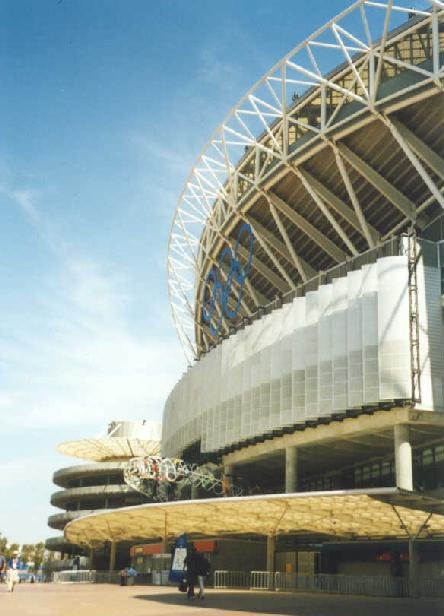
As you can see me, I am wearing my T-shirt supporting Danmark! This is one of the few days that I can wear the T-shirt.
It was a very sunny and warm day and the place was full of people. During the Olympics, you could only get access to the whole of the Olympic Park if you had a ticket. They had quite tight security, and had to go through a detector on the perimeter of the grounds after you got off the train/bus.
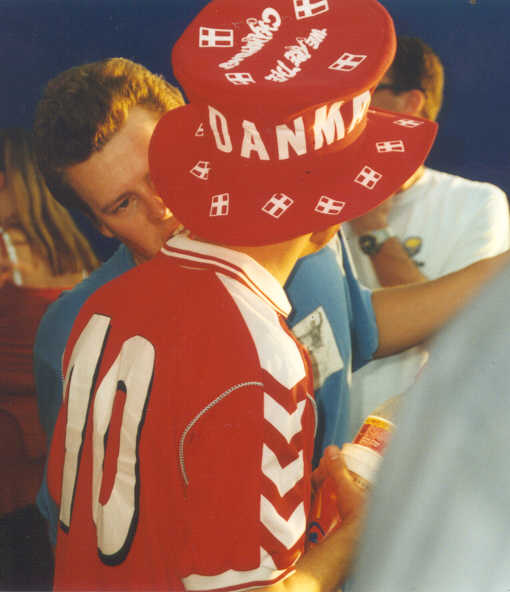
The handball game started at about 2pm and we managed to wander round for quite a bit before going into the arena wear the handball was.
The food as amazingly expensive! Normally a fruit salad would only cost about AUD$3, cost up to AUD$8 that day!. Bottles of water was double the price. They really made it a money-making event for tourists! The funny thing too, we noticed that as you entered Olympic Park, all of the signs were in French and English, and all the announcements were given in French first, then English. It was most peculiar!
As we got closer to where the handball games were being held, we saw a lot of Danes and Norwegians dressed in country colours! Danes in red and white and Norwegians... well, there was a guy there who had lots of cow bells around his neck and attached to his clothes. He was wearing a traditional metal helmet and dressed in old-fashioned gear. It was amazing to feel all the atmosphere - just to be there.
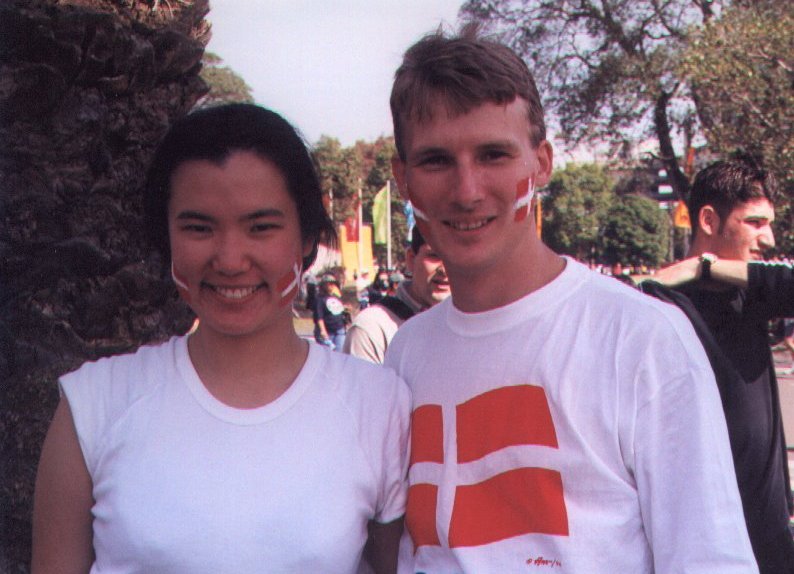
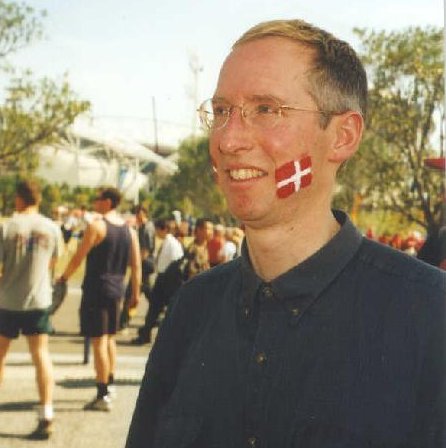 We were all in the true Danish spirit! Even my girlfriend was dressed in a white T-shirt and red pants! We painted flags on our faces with some face paint. We were definitely there to support the Danish team!
Even Lance could not help get caught in the moment with us! *smile*
We were all in the true Danish spirit! Even my girlfriend was dressed in a white T-shirt and red pants! We painted flags on our faces with some face paint. We were definitely there to support the Danish team!
Even Lance could not help get caught in the moment with us! *smile*
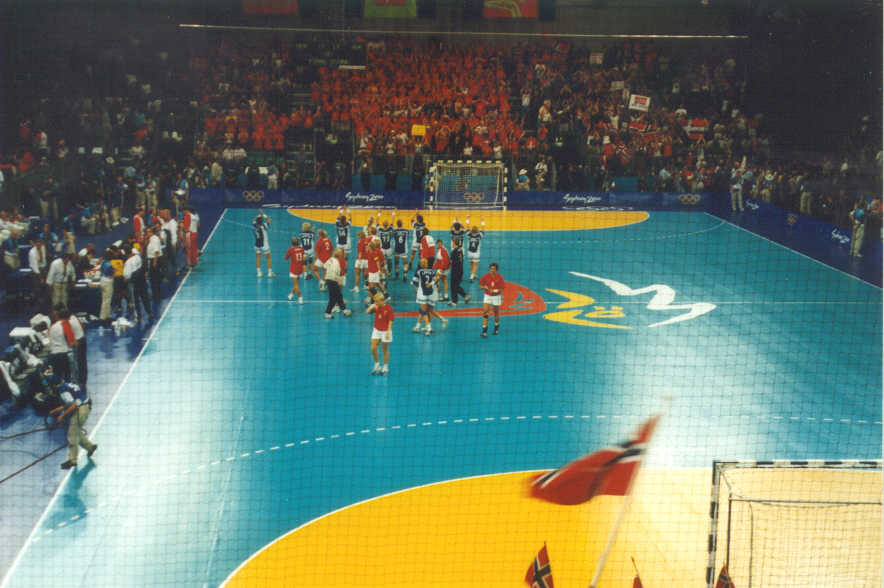 A break in the handball game - Danmark vs Norway!
Danmark in red & white, Norway in blue & white.
We had pretty good seats - it was a matter of whoever got there first, had the best seats, although we had to enter through certain doors.
All the journalists and officials sat on the left. We even heard that the crown prince of Danmark was there for the game, even though we could not spot him. There were flags everywhere, Danish and Norwegian waving about. Everytime Norway scored, you could hear countless numbers of cow-bells being rung! A few times, some of the people tried to start a Mexican wave, but that did not work out.
It was a very fast and furious game. It was the only handball game that the Danish lost in the whole Olympic Games, and they eventually came first in the finals!
A break in the handball game - Danmark vs Norway!
Danmark in red & white, Norway in blue & white.
We had pretty good seats - it was a matter of whoever got there first, had the best seats, although we had to enter through certain doors.
All the journalists and officials sat on the left. We even heard that the crown prince of Danmark was there for the game, even though we could not spot him. There were flags everywhere, Danish and Norwegian waving about. Everytime Norway scored, you could hear countless numbers of cow-bells being rung! A few times, some of the people tried to start a Mexican wave, but that did not work out.
It was a very fast and furious game. It was the only handball game that the Danish lost in the whole Olympic Games, and they eventually came first in the finals!
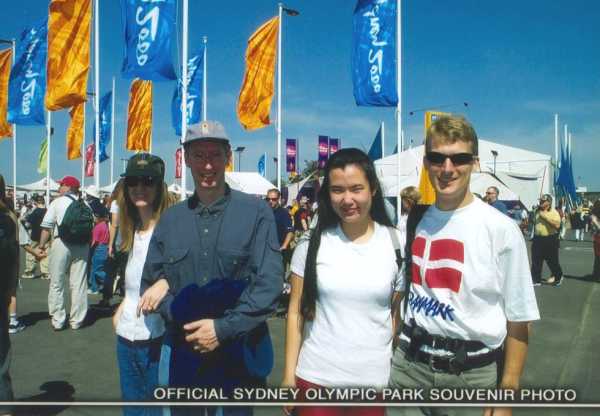
Just after entering Olympic Park, we managed to get a group photo!
As you can see the place is very crowded but very festive - you just had to be there!
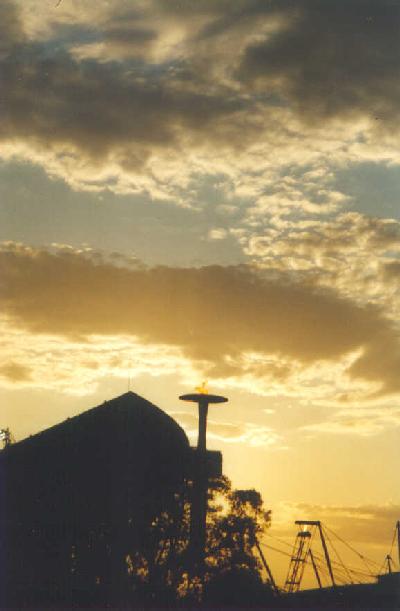
A most glorious sunset!
After the handball match, we wandered around for a bit longer. The day had been quite warm, so the night was a beautiful clear night.
After the Lenehans left, Arumi and I had a look at a small Aboriginal art exhibition located at the Park. We sat on one of the few grassy patches, to watch the flickering of the lights and just enjoy the day.
We eventually went home, but Olympic Park was still swarming with people, who were there to watch events that went on later into the night. Although we did not get the chance to see any other events during the Olympics, it was definitely worth the day we spent there. We would have loved to see the final game when Danmark won, but as usual, we were not very organised...
Below, I have included photos taken on the night of the Closing Ceremony.
These were taken from Graham's apartment on a hill at McMahons Point. We had a spectacular view of the fireworks that went off after the Closing Ceremony. It was really windy on the balcony, but I managed to get some photos of the Olympic rings that were placed on Sydney Harbour Bridge.
Beautiful, isn't it?
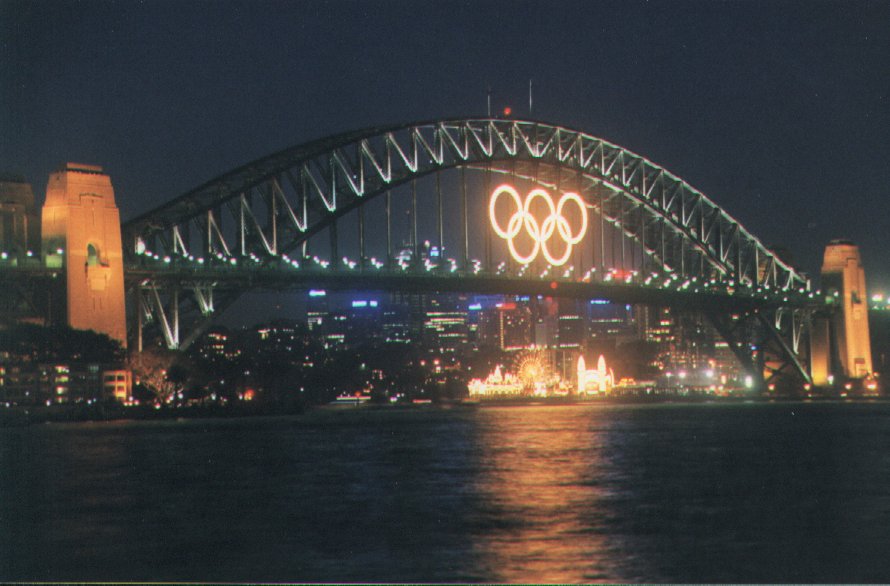
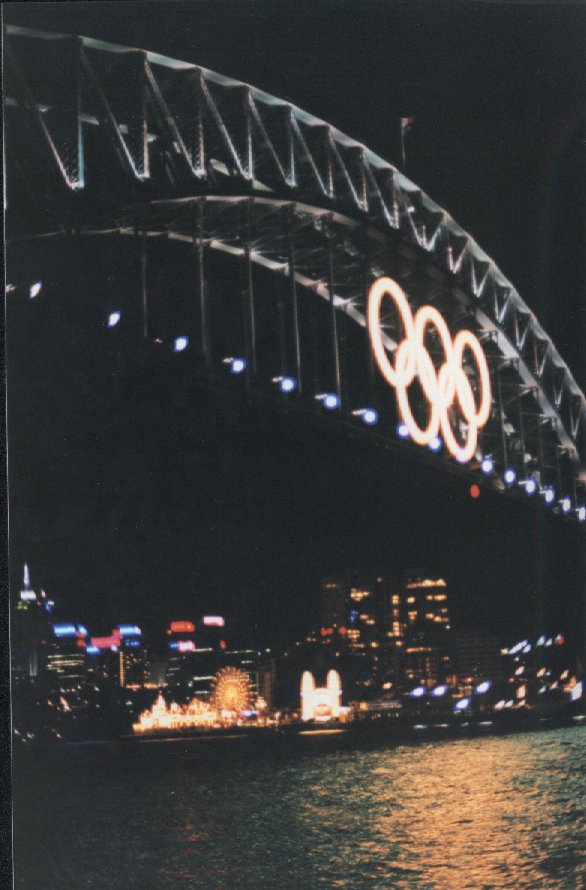
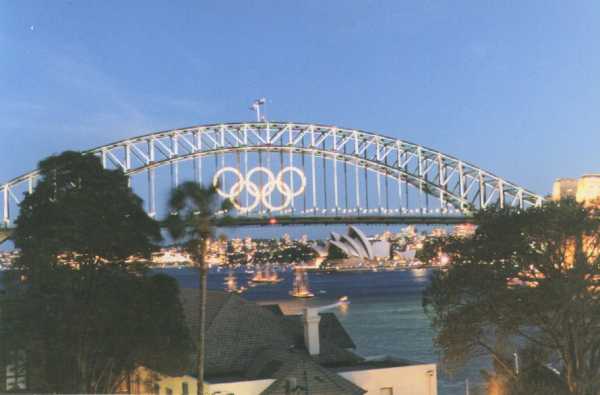
15. September 2000 11:05
by Rene Pallesen
0 Comments
In September 2000, just after I returned from my trip to Borneo, I had to buy this new car because my girlfriend had written off my car whilst I was away! *smile*
I did not look forward to hunting around for a new car, but I found a good buy locally. This car is a 1997 Ford Futura, with 4.0 litre, 6-cylinder, 220-horsepower, power-steering, central locking and electronic windows (I think I am starting to sound like a car advertisement...)
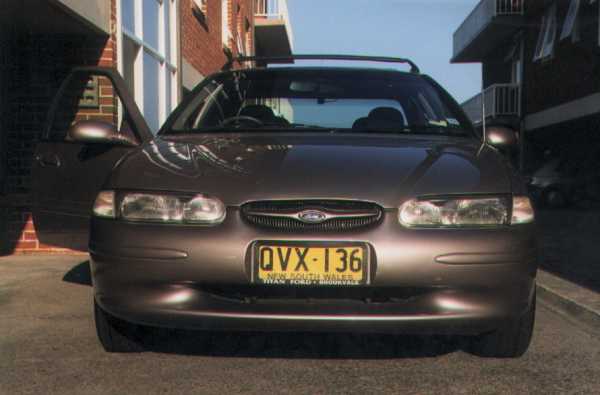

It is pretty much the same colour as my old car, and it feels so nice to drive!
As you can see, pretty similar, but I also really miss my old car! It had a lot of computerised features - from a digital odometer, to adjusting the internal temperature of the car. It was a pretty cool car and wished I could have kept it for another few more years.
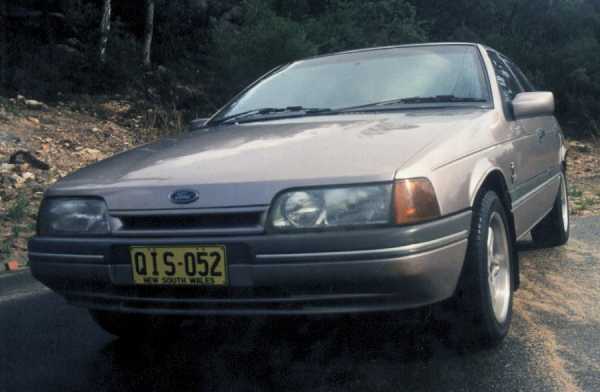

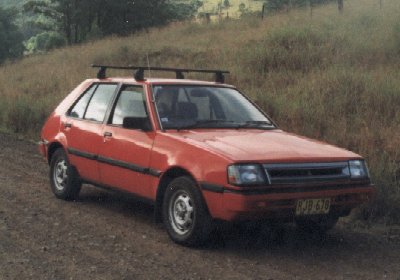
A huge contrast to my first car!
It is a red hatchback that I bought early 1998, a few months after I arrived in Australia. But someone wrote it off a few months after I bought it. It was a pretty bad accident, but luckily I was alright. I was only covered by Third Party insurance, and to go through a lot of paperwork just to get reimbursement for the car!
15. August 2000 10:43
by Rene Pallesen
0 Comments
Ecochallenge ( Sabah 2000 )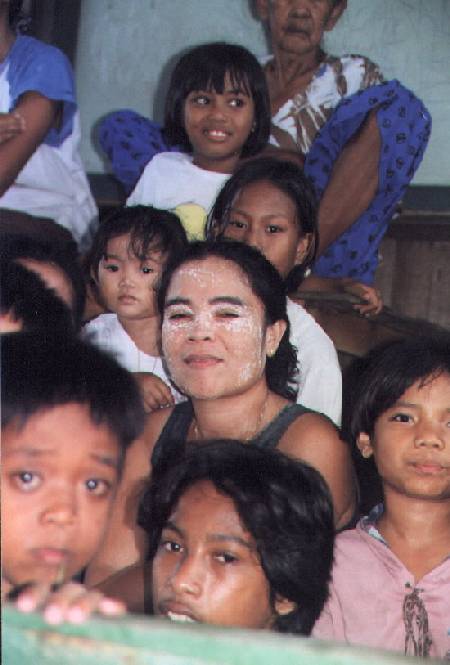 Away from Headquarters . . .I managed to explore the villages at Silam.
The people here wore this white stuff on their faces - I guess their form of sunscreen.
These people were refugees from the Philippines.
Away from Headquarters . . .I managed to explore the villages at Silam.
The people here wore this white stuff on their faces - I guess their form of sunscreen.
These people were refugees from the Philippines.
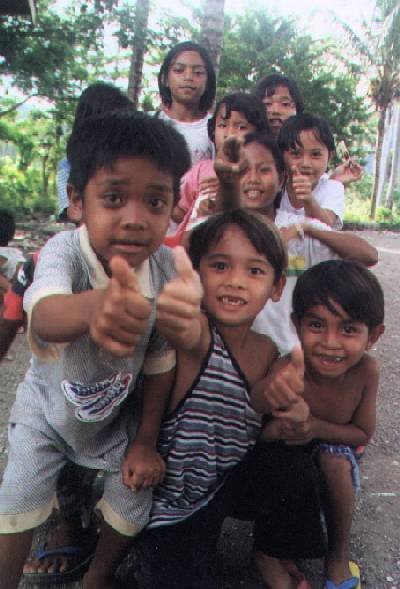
The kids were fighting to fit into the photo!
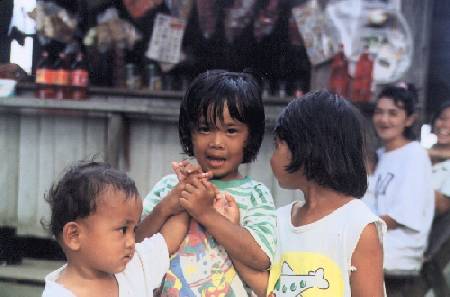
The kids here were really cute.
These kids here, had caught a monkey and was trying to sell it at the camp for 5 ringgit (AUD$2.50).
No-one wanted to buy it because they knew if they bought it, and set it loose, the kids would just catch it again, and try to sell it.
In general, there were lots of great photos at Silam village.
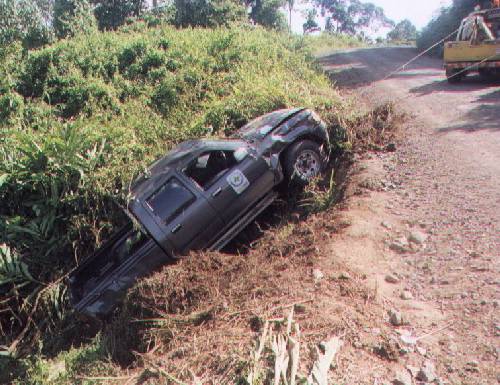
One of the helicopter pilots was driving through the jungle roads, took a corner too fast, and had a minor mishap.

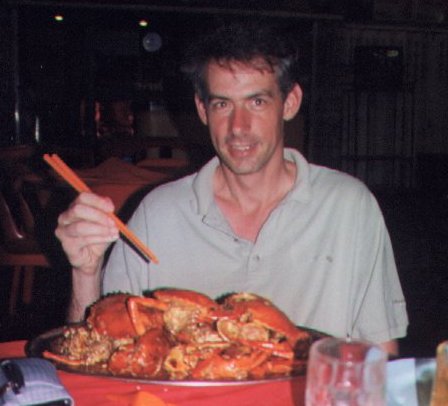 We headed into Lahad Datu to get some seafood!
An escape from camp food. Camp food was disgusting. There were live worms in the vegetables (yes, after cooked). Most of the food was not fresh, and was pretty boring. The seafood was fantastic here. Whenever we had the chance, we ate lots of seafood.
Yum... Paul did not get to eat all of the crabs - all of us had a portion of it.
We headed into Lahad Datu to get some seafood!
An escape from camp food. Camp food was disgusting. There were live worms in the vegetables (yes, after cooked). Most of the food was not fresh, and was pretty boring. The seafood was fantastic here. Whenever we had the chance, we ate lots of seafood.
Yum... Paul did not get to eat all of the crabs - all of us had a portion of it.
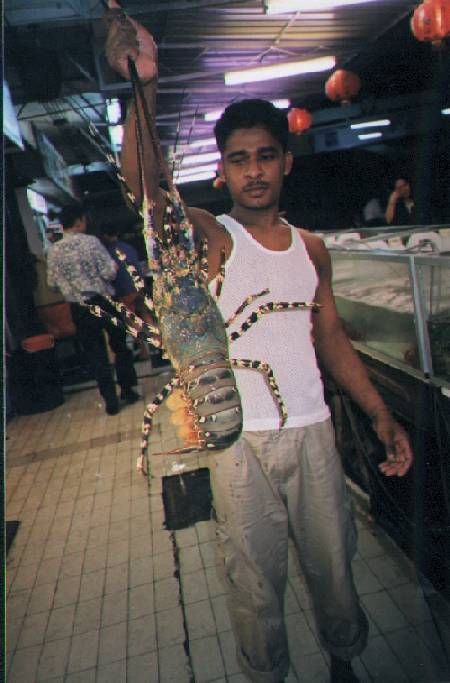
 Yummm... they were huge, but we did not eat them. They were too big for us to eat, pretty impressive though. They were the biggest lobsters I have seen in my life. We saw these at the same place we ate our seafood and frogs (below).
Yummm... they were huge, but we did not eat them. They were too big for us to eat, pretty impressive though. They were the biggest lobsters I have seen in my life. We saw these at the same place we ate our seafood and frogs (below).

We had this frog for dinner about 2 min after I took the photo.
This was actually when I went out with Glen in Kota Kinabalu - he asked me to pick some food and to surprise him.
I did not tell him till a year later that he ate frog meat. He asked me what it was, because he reckoned it tasted funny, but I did not tell him at the time.
I think he will only eat it again. Only if he really had to.
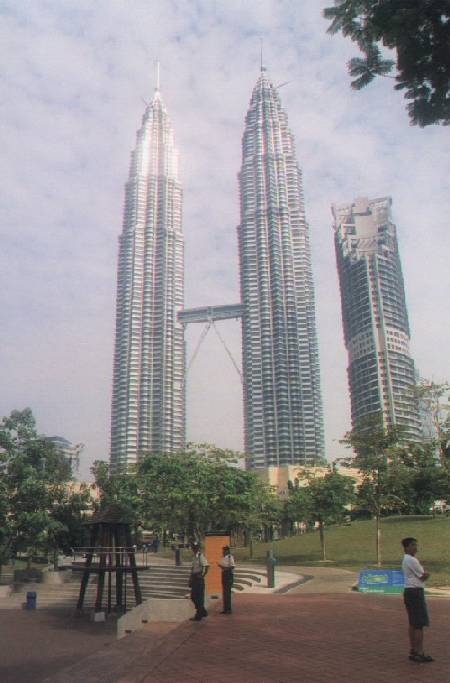
Petronis Towers - the tallest twin towers in the world.
Actually, they are the tallest buildings in the world, followed by the Sears Towers in Chicago.
The towers are joined by some sort pedestrian platform.
These towers are located in Kuala Lumpur.
I went to Kuala Lumpur to pick up my Permanent Residency for Australia.
Woohoo!!! After 2 years of lots of paperwork, and correspondence back and forth with Berlin, I finally managed to get it!
The inconvenience of it all, was that I actually had to leave Australia ie collect my PR before re-entering Australia.
Below, is the only photo I have of the Lateral Linking Team that I worked with during the race.
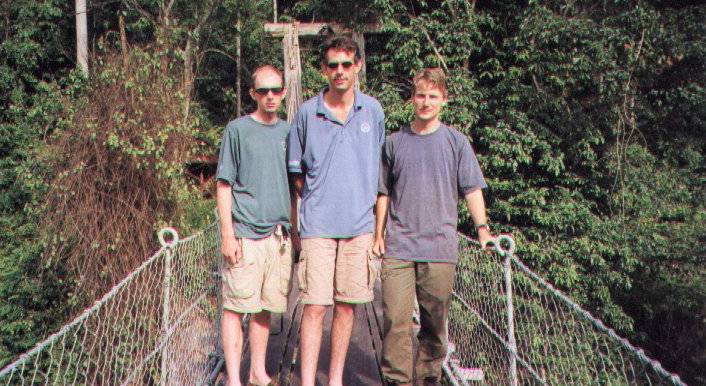 Back to TopReturn to Borneo Homepage
Back to TopReturn to Borneo Homepage
Created: 7 Dec 2001
15. August 2000 10:42
by Rene Pallesen
0 Comments
Ecochallenge ( Sabah 2000 )Helicopters . . .The radio communications team had to arrive a few days before that because we had to hand out over 2,000 pieces of radio equipment. We had problems getting the necessary approvals for helicopters so they were grounded! I ended having to hand out most of the equipment as Glen and Paul had to sort out our use of the helicopters.
We had to fly all the equipment to Silam before the start of the race, and our team managed to fly to Silam the day before the race started.
Do you believe that Paul managed to take a photo of me whilst I was flying the chopper? He was standing to the side of me, and took the photo at night time, with the door open ...
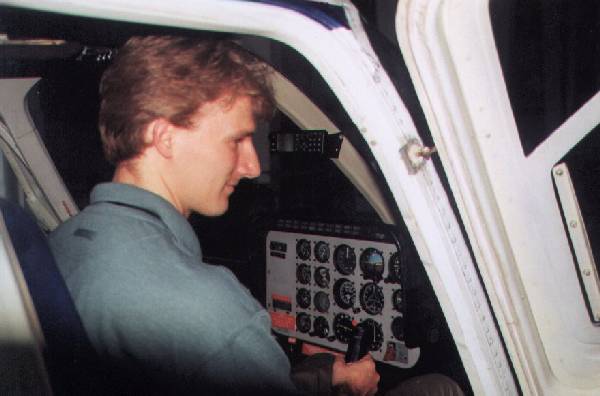
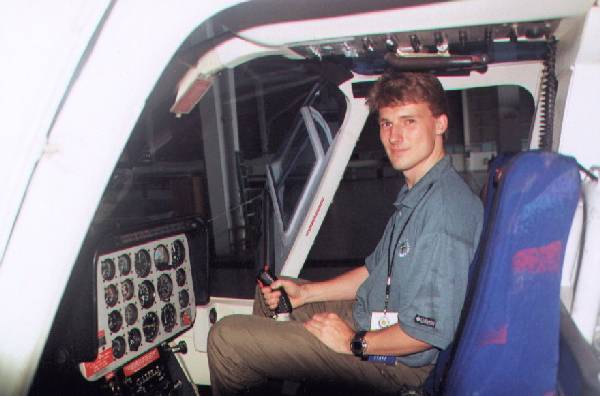 Just kidding.
A couple of days before the race started, I was at the airport most of the day. We had some problems with the radios in the helicopters... I must have been in and out of those helicopters at least 200 times.
I did manage to get someone to take some photos of me in a helicopter, looking very much like the pilot!
I had hoped that I had the time to explore Kota Kinabalue, but we were so busy, it had to wait.
Just kidding.
A couple of days before the race started, I was at the airport most of the day. We had some problems with the radios in the helicopters... I must have been in and out of those helicopters at least 200 times.
I did manage to get someone to take some photos of me in a helicopter, looking very much like the pilot!
I had hoped that I had the time to explore Kota Kinabalue, but we were so busy, it had to wait.
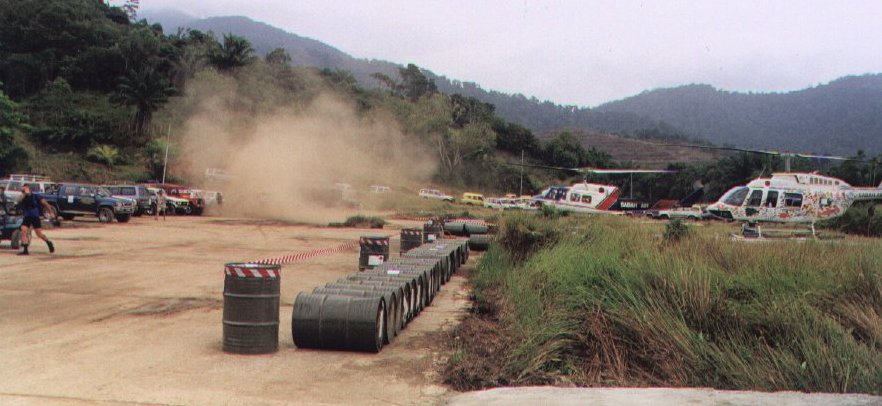 Here is the 212 or "Huey" - a twin-turbine Vietnam helicopter taking off. It is a hell a lot more powerful than some of the other helicopters we were using, which were 206s.
Here is the 212 or "Huey" - a twin-turbine Vietnam helicopter taking off. It is a hell a lot more powerful than some of the other helicopters we were using, which were 206s.
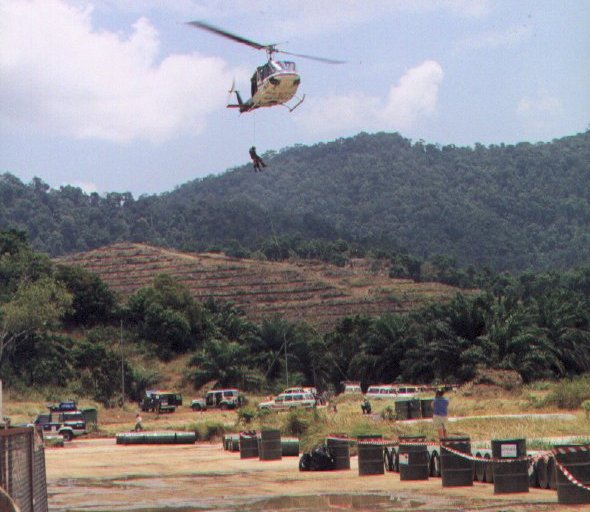 Here are the medical guys practising abseiling out of the helicopters (Aussie style)!
At the start of the race, I was sitting there listening to the first rescue on the radio.
3 hours after the start, four boats had capsized... helicopters and boats were very busy!
The competitors were due to arrive at Silam (another checkpoint) the next day (21st Aug).
For the first few days after the race started, I had to help organise to get the fuel to the top of the mountain.
After that the helicopter came in useful. It brought up 100 litres of fuel on the 4th day so I did not have to ferry fuel anymore!
Here are the medical guys practising abseiling out of the helicopters (Aussie style)!
At the start of the race, I was sitting there listening to the first rescue on the radio.
3 hours after the start, four boats had capsized... helicopters and boats were very busy!
The competitors were due to arrive at Silam (another checkpoint) the next day (21st Aug).
For the first few days after the race started, I had to help organise to get the fuel to the top of the mountain.
After that the helicopter came in useful. It brought up 100 litres of fuel on the 4th day so I did not have to ferry fuel anymore!
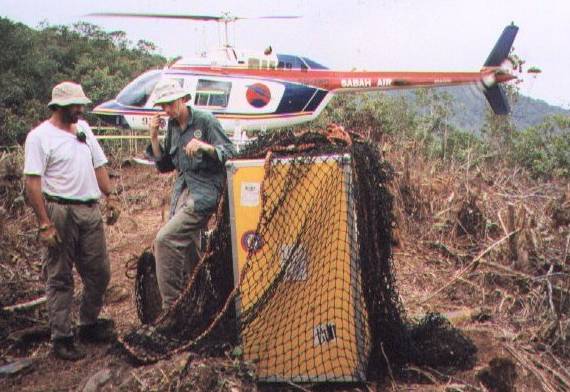
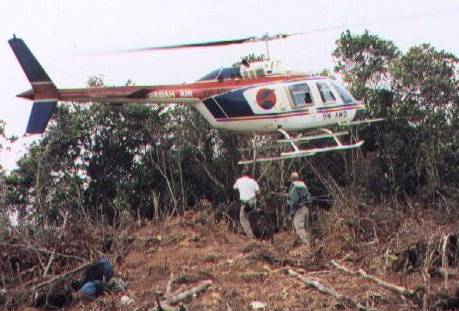 At the end of the race, we had to sling-load the repeaters, to get them off the mountain. That means we had to strap them onto the helicopters, and pull them off the mountains that way - quite effective really.
At the end of the race, we had to sling-load the repeaters, to get them off the mountain. That means we had to strap them onto the helicopters, and pull them off the mountains that way - quite effective really.
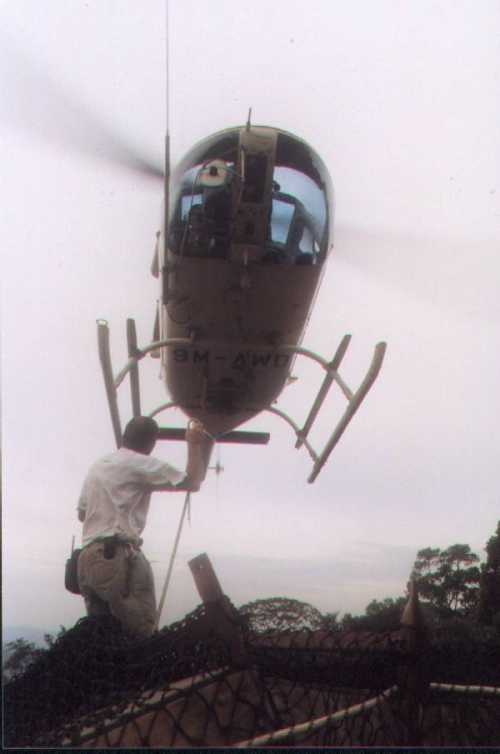
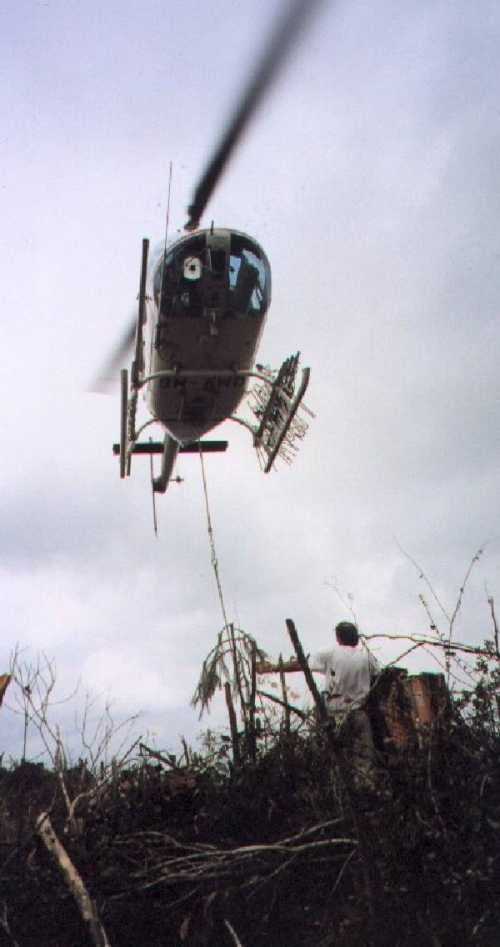
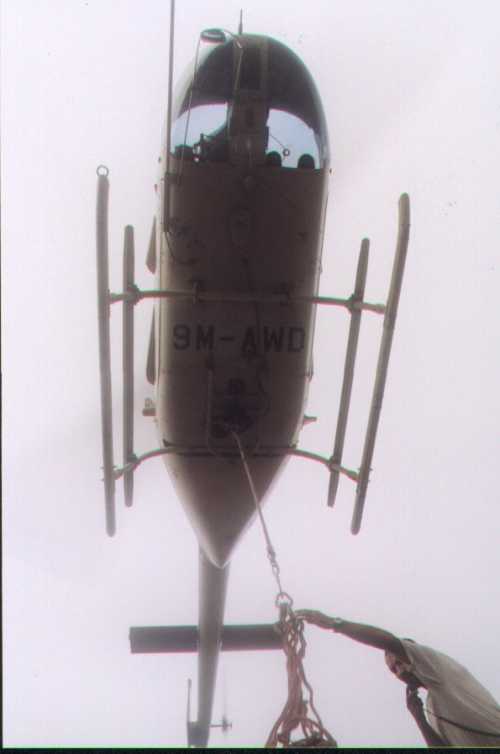
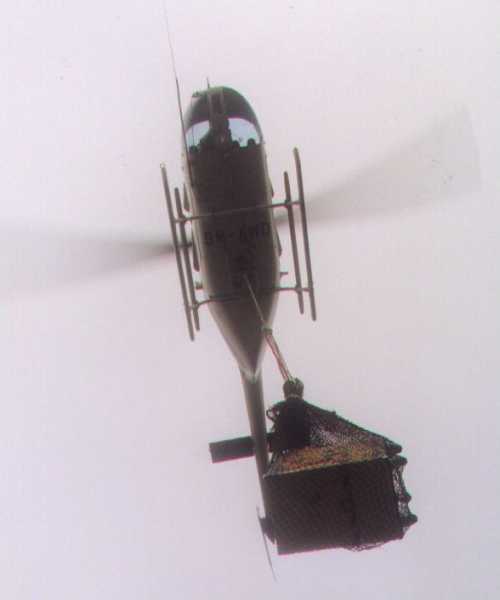
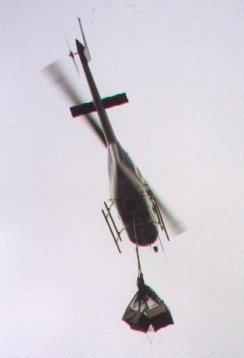
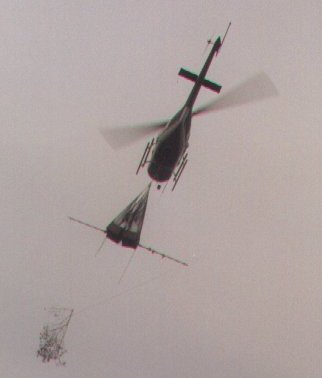
Repeater station finally airborne!
You can see a pole in the right photo.
My girlfriend asked me what it was for - it helps balance the load so that it does not keep swinging whilst airborne.
Below, you will see some pretty good photos from the chopper.
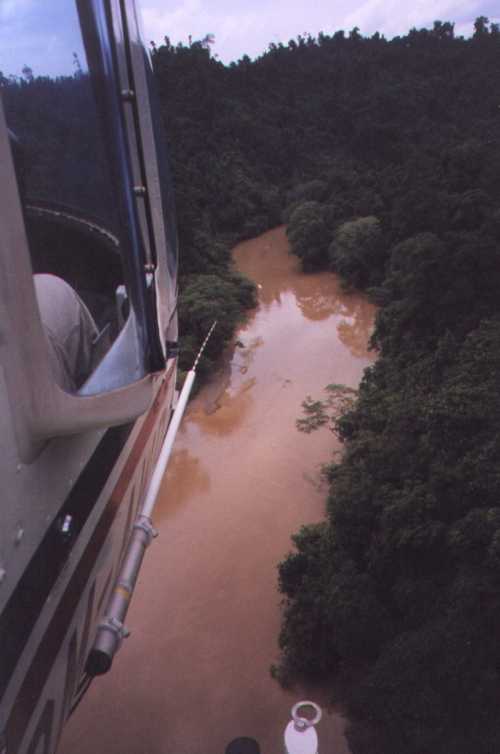
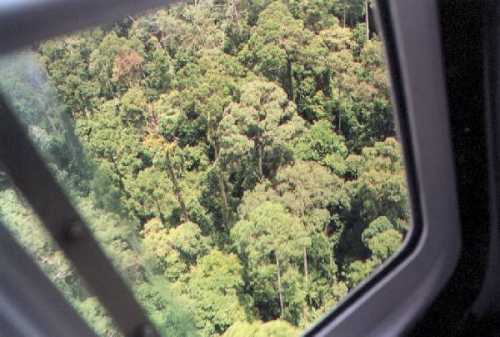
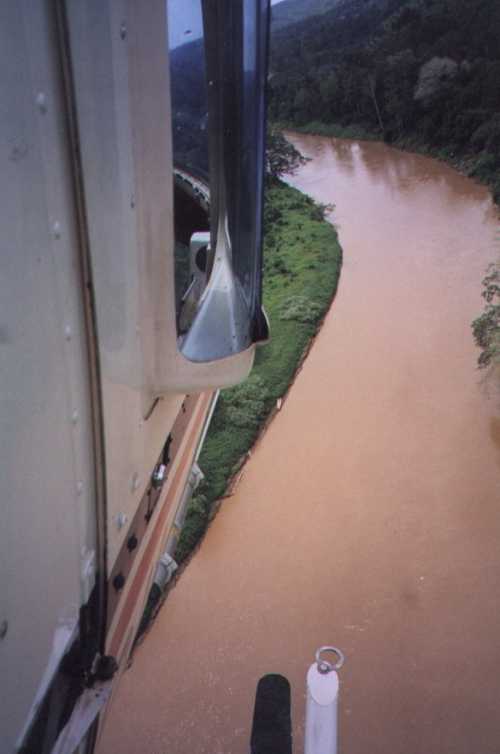 Towards the end of the race, we had to scan the rivers for the last competitors coming in - to make sure they had completed this section of the race course. It was low-altitude flying of the river-bed.
The photo on the left shows the chopper approaching Silam Village. This village was located just outside of Silam HQ.
Towards the end of the race, we had to scan the rivers for the last competitors coming in - to make sure they had completed this section of the race course. It was low-altitude flying of the river-bed.
The photo on the left shows the chopper approaching Silam Village. This village was located just outside of Silam HQ.
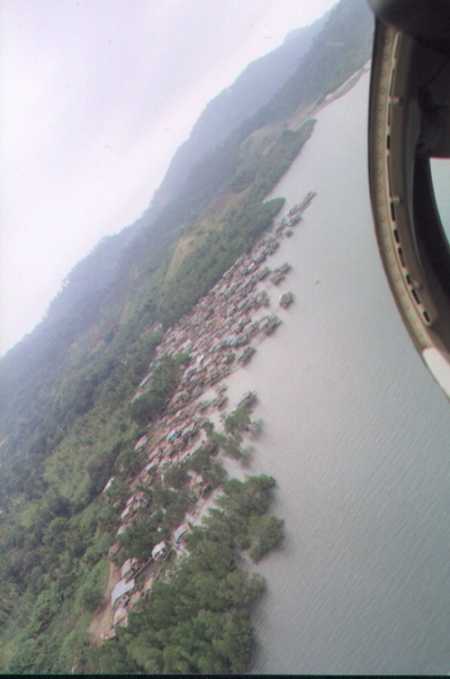
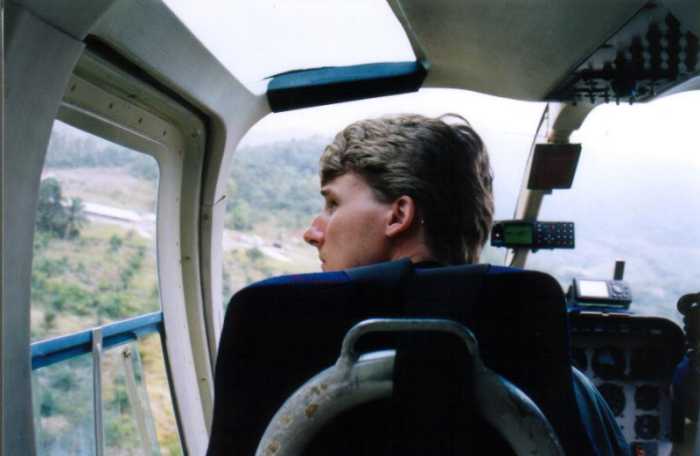 Glen liked wanted to have a photo of the back of my head - and I ruined the photo by turning my head as he took it...
Here's a sunset shot of the helicopters flying around.
I had to put in this fantastic photo - the lighting gives a really nice feel to the photo.
Glen liked wanted to have a photo of the back of my head - and I ruined the photo by turning my head as he took it...
Here's a sunset shot of the helicopters flying around.
I had to put in this fantastic photo - the lighting gives a really nice feel to the photo.
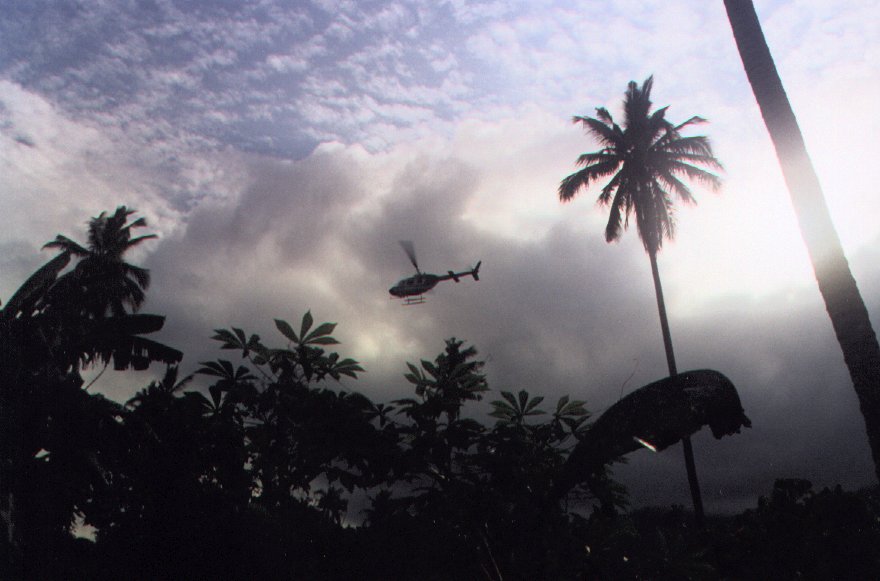 Back to TopReturn to Borneo Homepage
Back to TopReturn to Borneo Homepage
Created: 7 Dec 2001
15. August 2000 10:42
by Rene Pallesen
0 Comments
Ecochallenge ( Sabah 2000 )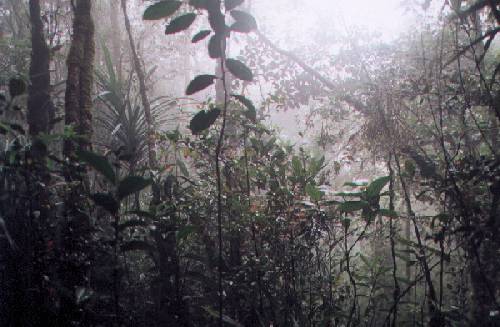
The Wildlife in Borneo . . .The jungles in Borneo are really dense, dark and humid.
You will find that some of the photos look as though they have been over-exposed, but in reality, it is just the humidity in the air.
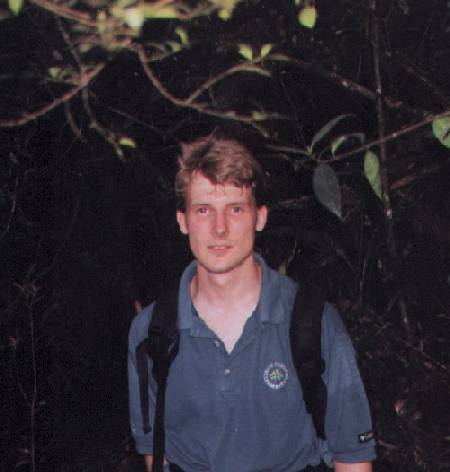
I have a photo of this at home - Glen enlarged it for me, and framed it!
Don't ask me why - I think I look rather wasted there.
Glen and I tried to race through the jungle.
The climb to the top of the mountain is rated as a 1.5 hour climb... Glen and I have done it in 26 minutes... actually I was confident that I could do it in less than 20 and so I did!
I held the record of taking 17 minutes to race to the top of Mt Silam, covering a distance of approx 4 kilometres through the jungle, up a mountain.
I was getting really fit (My girlfriend was proud of me).
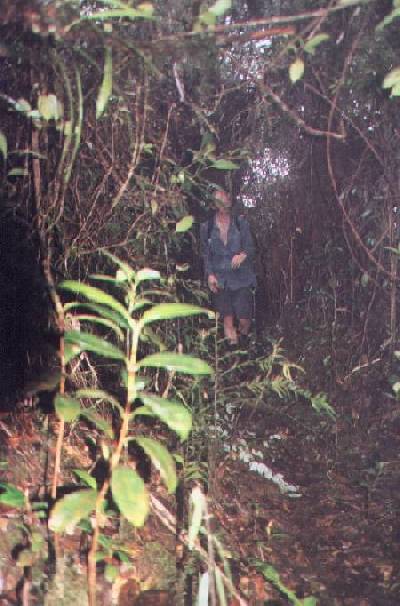


This photo shows how dense and dark the jungle can be. It was so humid there... no, not because I hadn't cleaned my lenses.

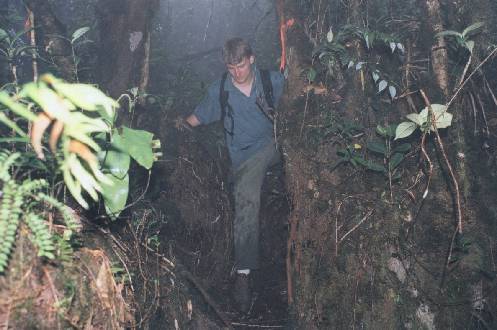 You can see how muddy it is in the jungle - I became quite dirty after many trips into the jungle.
You can see how muddy it is in the jungle - I became quite dirty after many trips into the jungle.
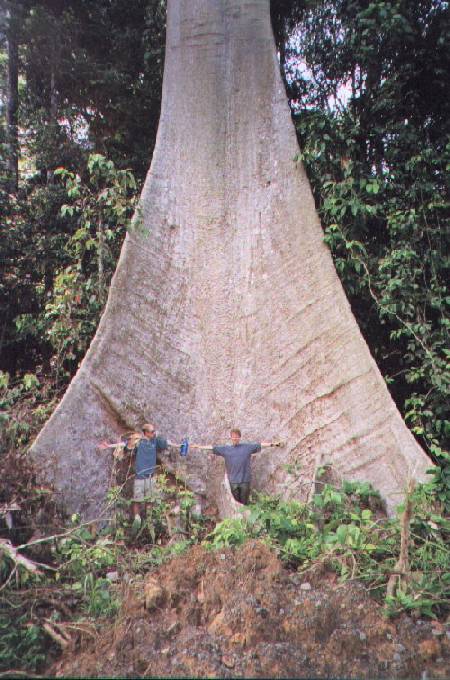
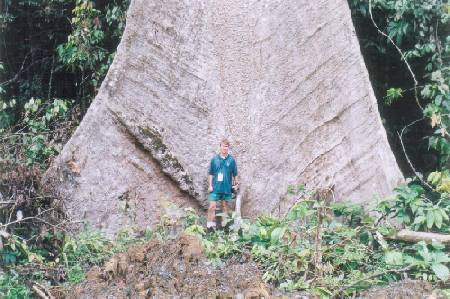
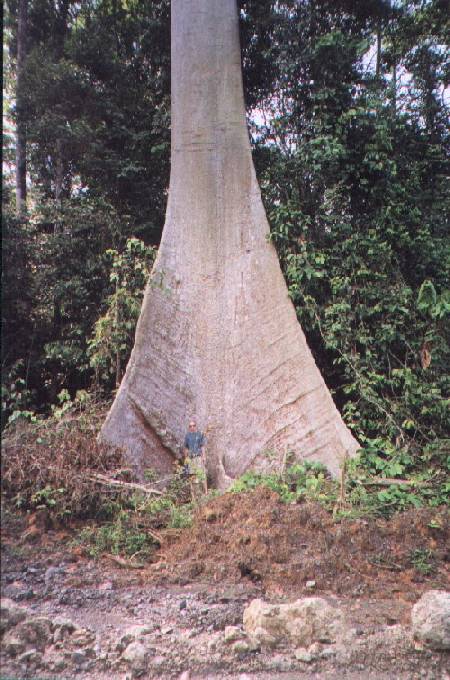
I think these trees are just as big as the Californian Redwoods. They might not be as old, but definitely just as big.
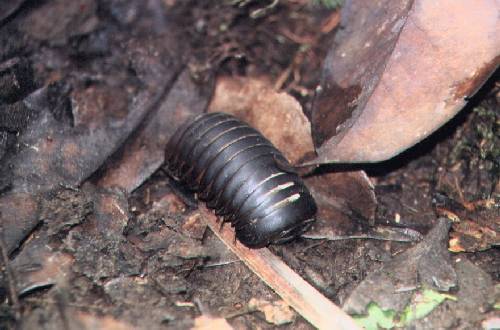
This was taken with a 300mm lens, from 1.5 metres.
The most amazing thing about them, is when they are scared, the curl up into little "marbles".
It looks like a small bug, but it is actually at least 7cm long, which is actually quite big.
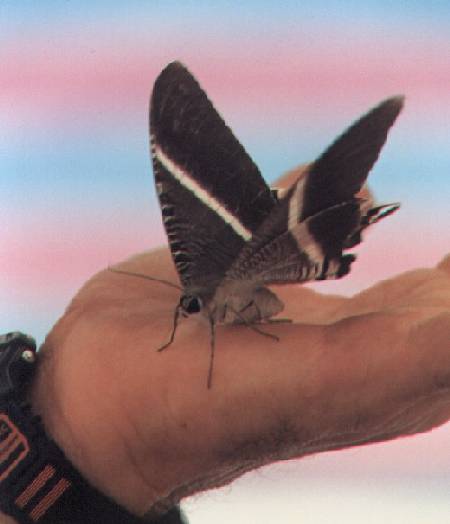
I noticed in Borneo, most of the insects there were huge.
The wingspan of the brown moth was about 15cm wide - huge!
They are mostly active at night, which is quite common for creatures in the jungle.
A couple of the girls stationed in the jungles, was stationed here. Not a wise decision, considering these girls were paranoid about the insects.
(Note: in the photo below, I still had conjunctivitis) I had the red eyes for most of the trip.


Big and beautiful, don't you think? You can see how big the black moth is compared to the size of the telephone.



These plants were kind of special because each branch split into two, so by the end of it, they formed a hexagonal pattern.
Below, are plants known as the "pitcher" plant.
The pitcher plants are meat-eating plants - you have watch out not to fall into them because they will swallow you whole.
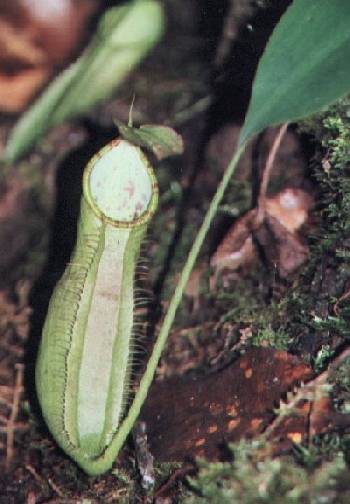
If you just believed that, you are very gullible! *laugh*
The pitcher plant, like other carnivorous plants, feed on insects.
They have sweet-smelling nectar that attract the unsuspecting insect to it.
When the insect lands, it finds the surface slippery and fall straight into the “pitcher”, where the plants juices drowns it and is digested by the plant.
You may have heard of other type of carnivorous plants such as the Venus Fly Trap, and the Sundew plants.
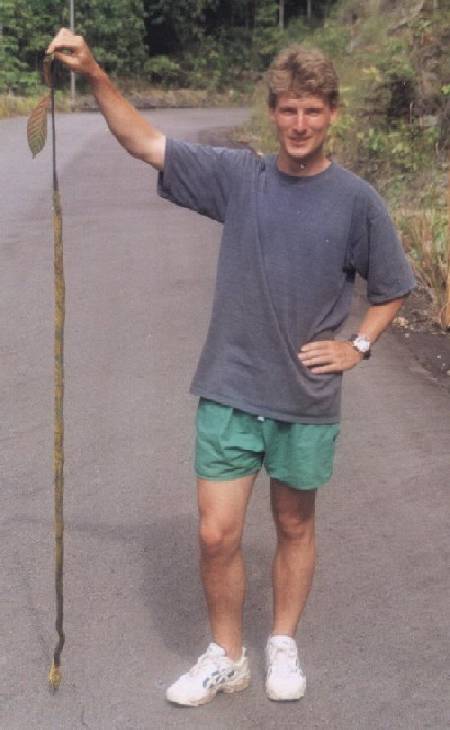
Yes, you see me holding the snake with a leaf.
It was a poisonous snake, and I was worried about it's venom getting on my skin.
For example a puff adder, contact with the venom numbs the skin.
I was not familiar with the snakes in Borneo, and was not about to risk it.
 The tarantella was sitting inside the catering tent hunting.
Everyone was looking at it and admiring it, which was pretty amazing, considering I know many people who would willingly kill a spider in sight.
The tarantella was sitting inside the catering tent hunting.
Everyone was looking at it and admiring it, which was pretty amazing, considering I know many people who would willingly kill a spider in sight.
Back to Top
Return to Borneo Homepage
Created: 7 Dec 2001
15. August 2000 10:41
by Rene Pallesen
0 Comments
Ecochallenge ( Sabah 2000 )Repeater Stations . . .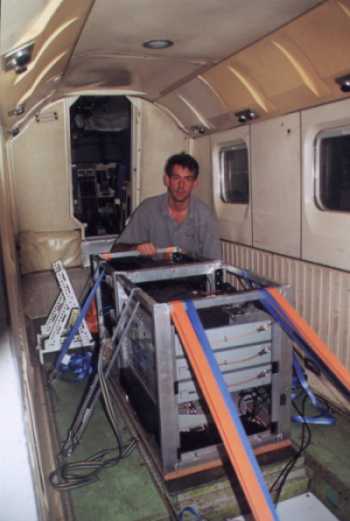
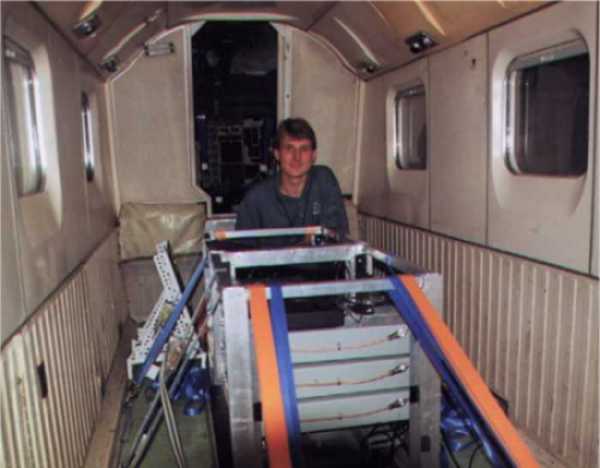 Here, you see Paul and I transporting some of the repeater stations by air.
From Silam, we flew down to DFVC. We stayed there for three days before going back to Silam.
Here, you see Paul and I transporting some of the repeater stations by air.
From Silam, we flew down to DFVC. We stayed there for three days before going back to Silam.
 I am at one of the repeater sites. Here, the top of one of the mountains was cleared, so we could safely land a helicopter there.
Oh... did I forget to mention that I almost chopped one of my fingers in half at the repeater site?
On top of my infected eye, I had another thing for the medical team to look at. The fingernail had been chopped in half and there was not much I could do about it except clean it up and try to avoid infections. The medical team was great there... they were extremely good.
I am at one of the repeater sites. Here, the top of one of the mountains was cleared, so we could safely land a helicopter there.
Oh... did I forget to mention that I almost chopped one of my fingers in half at the repeater site?
On top of my infected eye, I had another thing for the medical team to look at. The fingernail had been chopped in half and there was not much I could do about it except clean it up and try to avoid infections. The medical team was great there... they were extremely good.
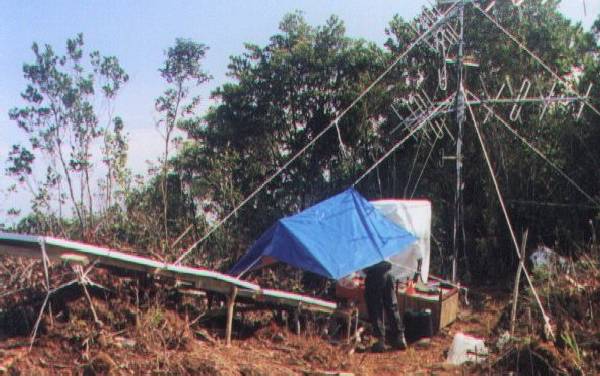
We had a few problems with some of the communications gear.
Paul and Glen were handling it, and at times I tried to assist.
The first few days had been really tough.
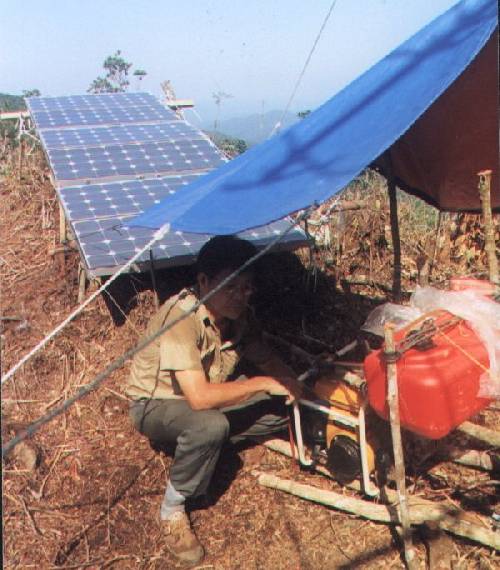
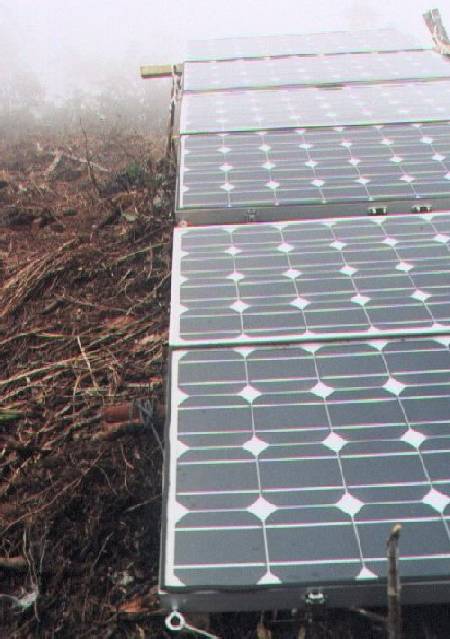
The top of Silam is covered in clouds for most of the afternoons, so the solar panels are quite useless. A survey of the conditions made prior to the race was useless.
If you ask any of the locals, they would have told us that the peak is always covered in clouds... but apparently no-one asked them!!!

We had problems keeping the generators running - they were using more power than predicted and there was no sun on the top of Silam to recharge the batteries.
The generator itself was a re-built petrol engine with a car alternator on it.
We basically tried to use a system where we used a jerry can, cut holes into it, and relied on the force of gravity to transport the fuel to the generator.
This design ended up working best for us.
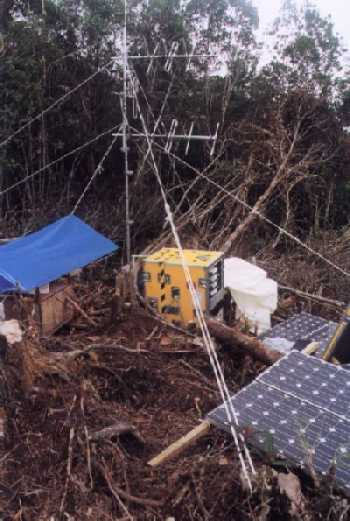
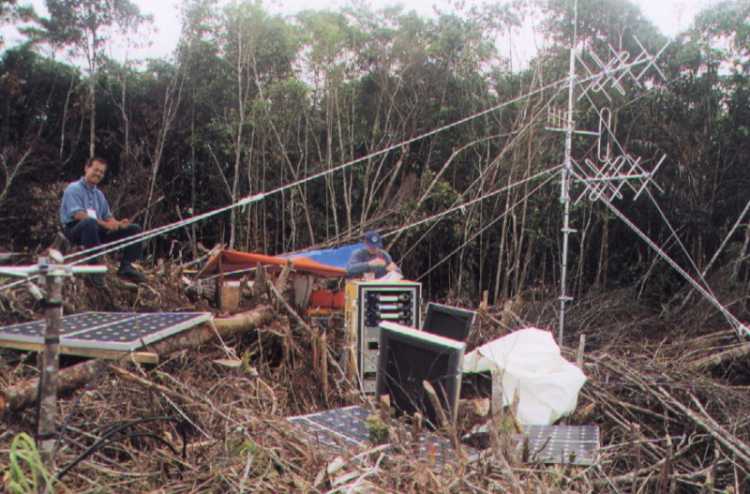
Our helicopter pilot sitting on the side there, just grinning...
On the third day of the race, I hiked up the mountain three times. I was really tired and all I could think of was getting a bit of a rest and some food. I managed to get a bit once I got to Danum. In Danum I managed to get 6 hours sleep before someone woke me up and told me that the repeater had died in Silam... again all the cars had to leave in a convoy... so rush, rush to find my driver and managed (just) to get into the convoy!
The road to Danum closes at 6.30pm and all the cars had to go in the convoy.
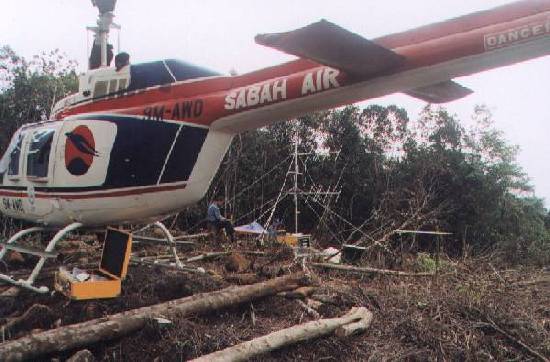

The helicopter flew all of us to the top of the mountain, and waited there for us till we were finished. Glen quite often told the pilot, "You don't have to shut down, because we'll only be here for 5 minutes." Well... quite often, we were there for as long as an hour and half! (Don't worry, the pilot was sensible enough to shut down immediately... he got to know Glen very well.)
I went up there often make sure that it was still running. It is much better getting a helicopter to fly me up there so that I can bring some fuel with me !
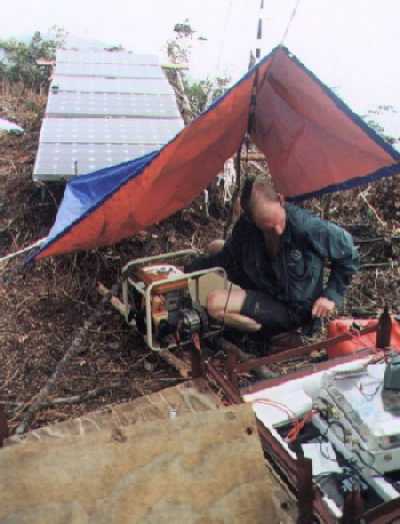
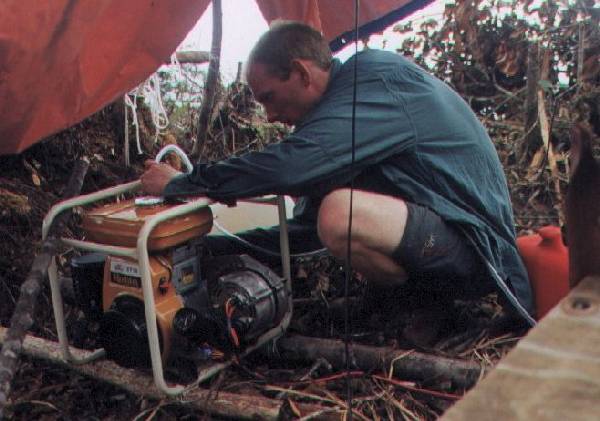 Glen has mostly been on top of the mountain getting the generator back online.
Glen has mostly been on top of the mountain getting the generator back online.
We have to keep the generator running 24 hours per day until the end of the race.
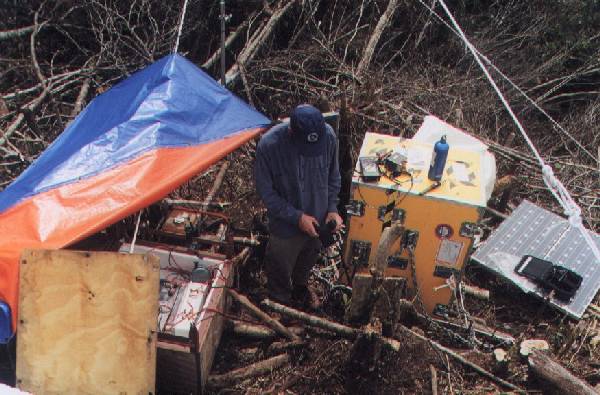
On the third night after the race started, one of the repeaters went dead.
I had to hike up the mountain on the previous day as the generator had died.
I did not leave the mountain until it was dark, so I had to climb down through the jungle in the dark!
Fortunately I had my torch with me!
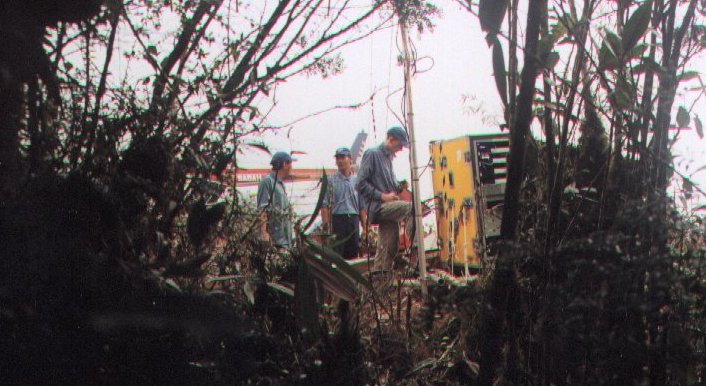
Paul later gave me strict instructions to make sure that I leave the mountain so that I could be back at HQ while there was still light!
I found out that I did not have any problems navigating at night... I even offered Paul to go back up when the repeater died!
Anyhow, we ended up having to send the airborne repeater up!
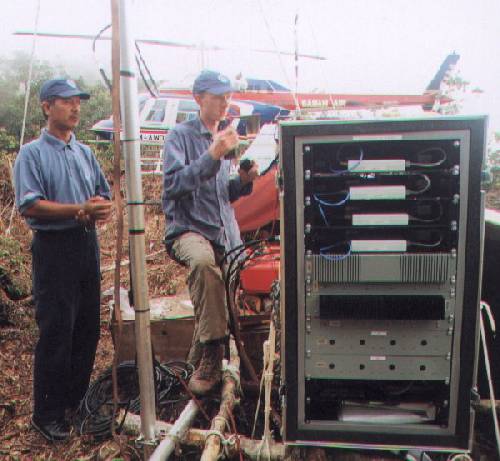
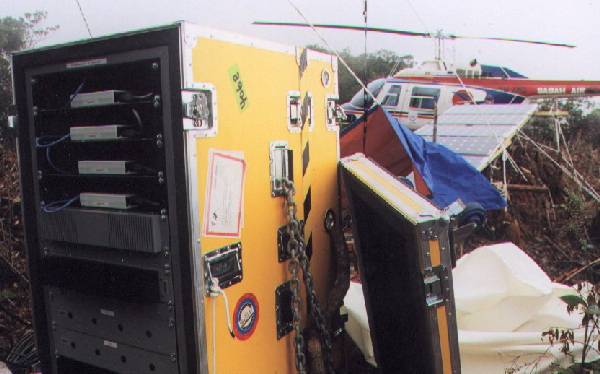

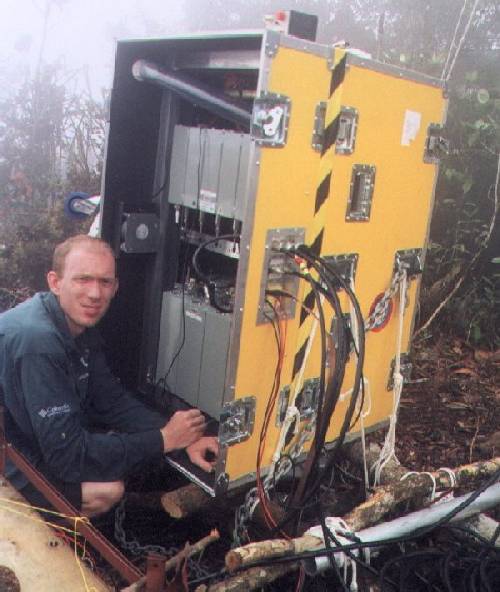
Back to TopReturn to Borneo Homepage
Created: 7 Dec 2001
15. August 2000 10:41
by Rene Pallesen
0 Comments
Ecochallenge ( Sabah 2000 )The Competitors . . .The competitors did not rest... three of the teams were half way through the 600 kilometre course after only three days... pretty amazing!
Two of the teams were Australian. 18 teams were out of the race. At least 10 of these were due to medical problems.
Hardly any people around here get enough sleep... the place is active 24 hours per day because there are always competitors coming in!
I was keen to find out how the Danish team would turn out. At the beginning of the race, they were not very sociable. But by the end of the race, I think the tension of the race had gone, and I managed to have a chat with them. By the third day, the Danes are doing pretty well... they had a 22nd place!
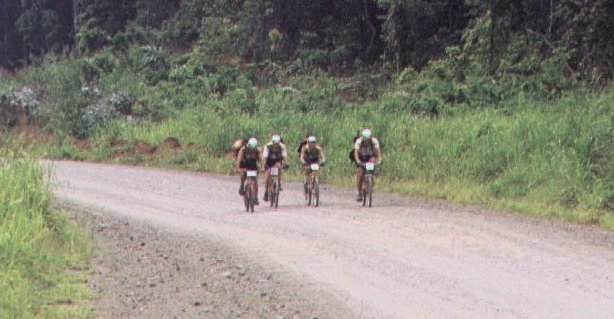
 This was the mountain-bike leg of the race.
The guy you see being transported to hospital in the helicopter (photos below), was doing this part of the race. He was rounding a corner on his bike and rode straight into a large branch.
This was the mountain-bike leg of the race.
The guy you see being transported to hospital in the helicopter (photos below), was doing this part of the race. He was rounding a corner on his bike and rode straight into a large branch.
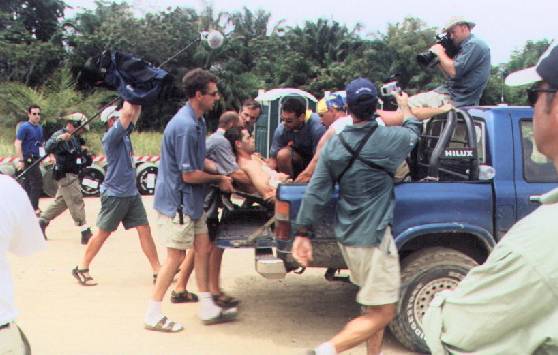
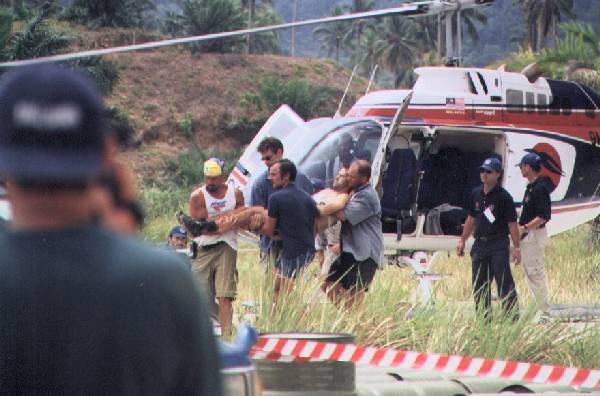 We had a lot of medical urgencies... we almost lost a guy with a punctured lung !
We had a lot of medical urgencies... we almost lost a guy with a punctured lung !
I got some great photos and helped getting the guy into the mobile hospital. There was a lot publicity on the website and through the media about it.
Fortunately, he was only 15 minutes away from HQ, so it was possible for us to get him to the helicopter very quickly, and to the nearest hospital.
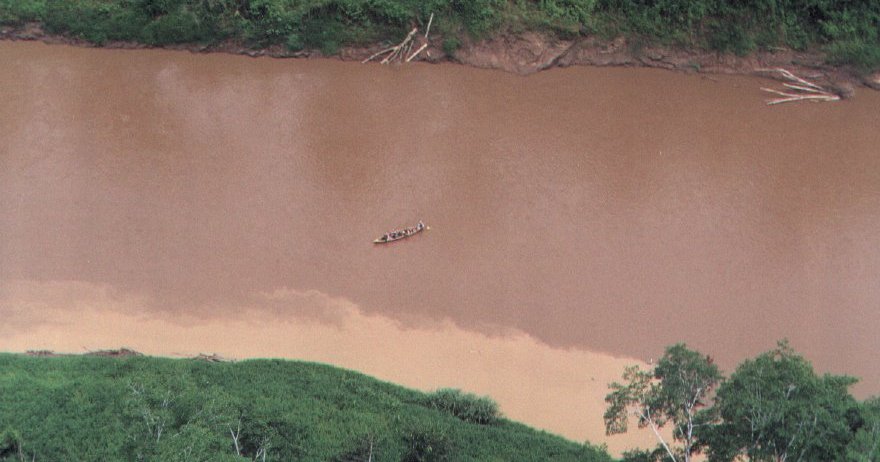 Another leg of the race involved rowing in these “sampans”, a Malay term for “boat”. At some point, the teams in the race had to also split up - some of them swimming, some of them rowing, to complete the water leg of the race.
Below, the competitors had to use a flying fox to cross the canyons. I managed to have a go at it - compared to rock-climbing... well, I found it pretty boring *smile*. I imagine most people would find it quite fun though.
Another leg of the race involved rowing in these “sampans”, a Malay term for “boat”. At some point, the teams in the race had to also split up - some of them swimming, some of them rowing, to complete the water leg of the race.
Below, the competitors had to use a flying fox to cross the canyons. I managed to have a go at it - compared to rock-climbing... well, I found it pretty boring *smile*. I imagine most people would find it quite fun though.

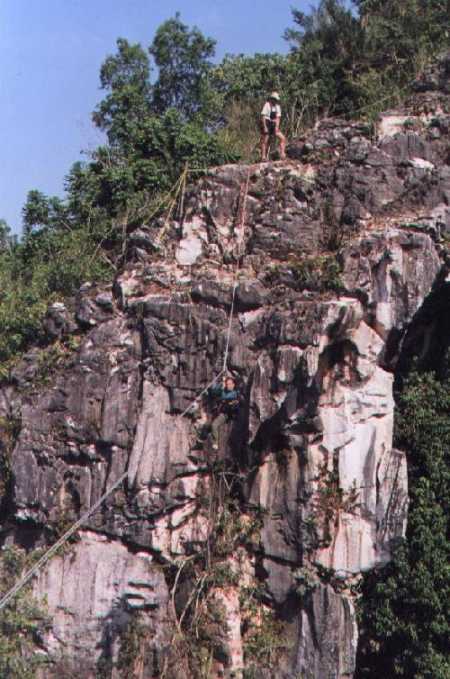 There are no places to climb here.
I had hoped to take one of the helicopters to Madai Caves to check out the 200 metre abseil. The road to the Madai Caves lead directly through the tiny village of Gua Madai - a small cluster of homes, their wood bleached grey.
The town’s main sources of income are tourism and birds’ nests. The nests are found high up the walls of the cave, tucked away in cracks and crevasses, and can command thousands of dollars. They are harvested about three times a year.
My girlfriend mentioned trying "bird's nest soup" whilst I was there. She said normally the bird's nest they use belong to the swallow. It is a delicacy to many Asians, and similar to shark's fin soup - that is if you have tried it. Normally the nests are made out of the birds' saliva.
There are no places to climb here.
I had hoped to take one of the helicopters to Madai Caves to check out the 200 metre abseil. The road to the Madai Caves lead directly through the tiny village of Gua Madai - a small cluster of homes, their wood bleached grey.
The town’s main sources of income are tourism and birds’ nests. The nests are found high up the walls of the cave, tucked away in cracks and crevasses, and can command thousands of dollars. They are harvested about three times a year.
My girlfriend mentioned trying "bird's nest soup" whilst I was there. She said normally the bird's nest they use belong to the swallow. It is a delicacy to many Asians, and similar to shark's fin soup - that is if you have tried it. Normally the nests are made out of the birds' saliva.
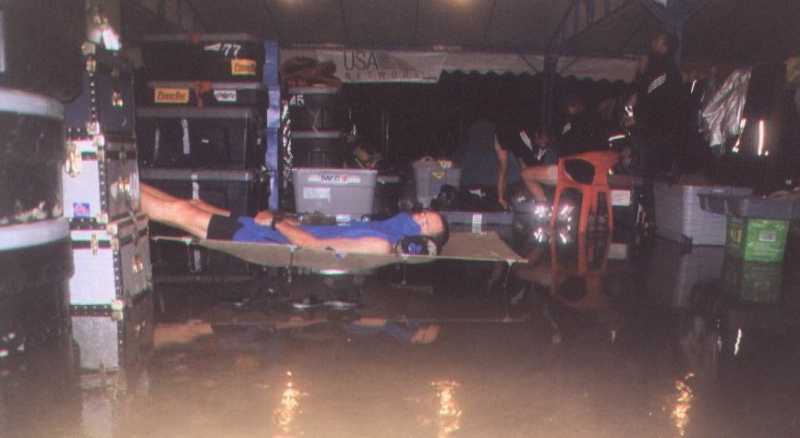
There was so much rain at Silam that HQ was often flooded.
Many of the competitors took the opportunity to get some sleep and the slept on whatever they could find.
Back to TopReturn to Borneo Homepage
Created: 7 Dec 2001
15. August 2000 10:40
by Rene Pallesen
0 Comments
Ecochallenge ( Sabah 2000 )Silam and Jungle Ops . . .It is so bloody hot in Silam! It must have been at least 40 degrees and 100% humidity!
Silam was the overall headquarters, and Danum Valley Field Centre (DVFC) was referred to as Jungle Ops. Jungle Ops controlled all radio communications and conducted the race through the the jungle.
From Kota Kinabalu, we flew to Lahad Datu and drove the rest of the way to Silam. Silam was the site of one of the repeater stations. We had to set up a HQ a few kilometres from this station... heaps of opportunities for a few walks in the jungle.
The operation at Silam was huge!... I had never seen such a busy place before. The place was crawling with energy. It was bigger than any military operation I had ever seen! You would be amazed to see the logistics involved in this project ! At the time I did not have the time to take a lot of photos.
We had many army trucks transporting the competitors' equipment - very good cooperation from the military. They helped out with the preparation and set-up of HQ, and with the transportation of fuel.
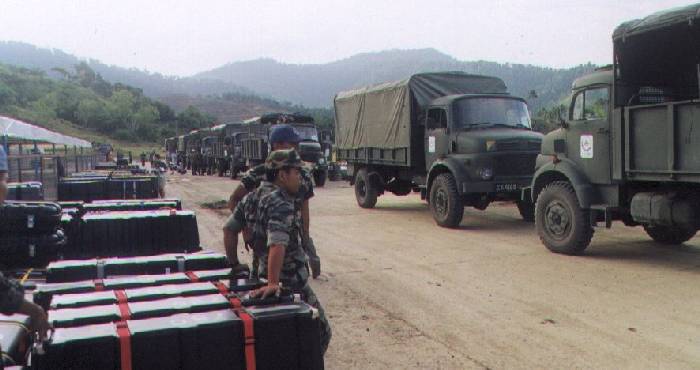
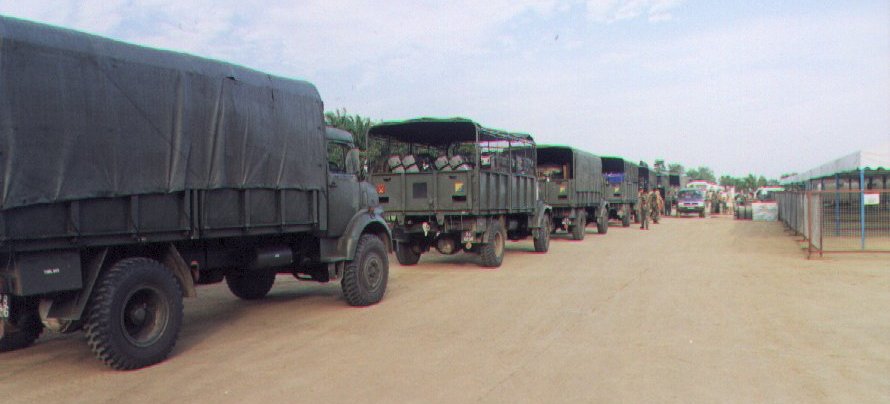
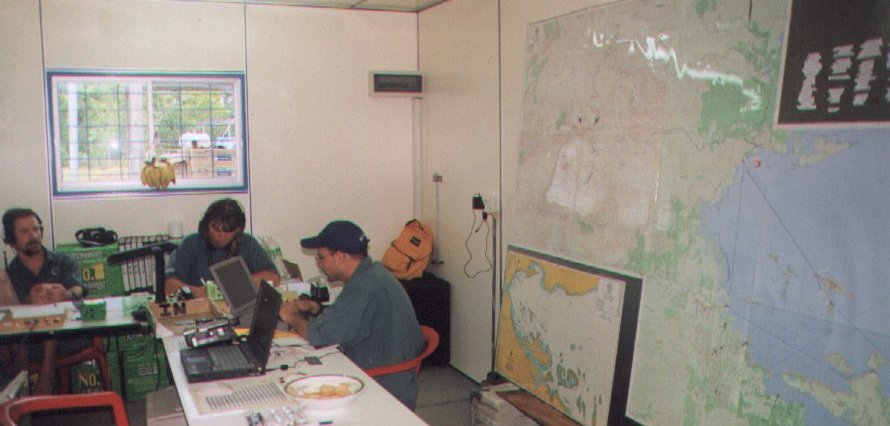 This is the headquarters on the left.
The whole Ecochallenge race is governed from this office.
The map in the background contains the position of all the checkpoints at which the competitors have to go through.
This is the headquarters on the left.
The whole Ecochallenge race is governed from this office.
The map in the background contains the position of all the checkpoints at which the competitors have to go through.
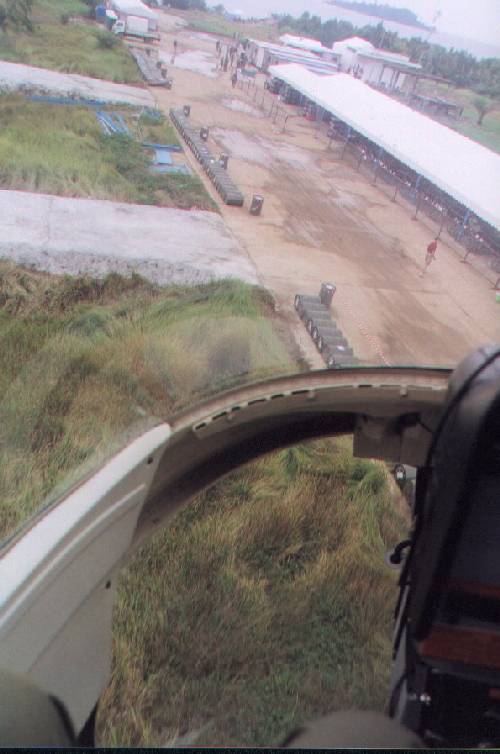

Both of the above photos are aerial shots of HQ and were taken from a helicopter.
I managed to get a nice aerial shot of Silam HQ. The big white patch in the middle is where the competitors stored all their equipment. Just to the left are the containers from where the race is controlled. The 4 'finger-like' white pads on the right are the heli-pads. The long rectangle to the left is the eating area, and just above it is the hospital.

Approaching DVFC in helicopter.
This is actually a research centre in the middle of the jungle - commonly known as DVFC (Danum Valley Field Centre).
DVFC is not normally accessible the tourists and the general public, only to researchers.
DVFC is concerned about contamination into the jungle.
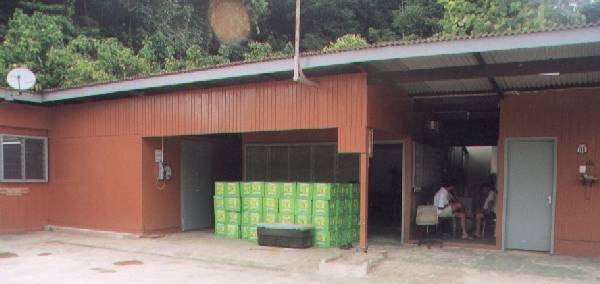 Outside Jungle Ops HQ.
The green boxes contain bottled drinking water.
By the time the race was over, most of this had been consumed - quite amazing really, considering there were really only 10 people at Jungle Ops.
During the competitors were not allowed any help from us, and that included the provision of drinking water.
Outside Jungle Ops HQ.
The green boxes contain bottled drinking water.
By the time the race was over, most of this had been consumed - quite amazing really, considering there were really only 10 people at Jungle Ops.
During the competitors were not allowed any help from us, and that included the provision of drinking water.
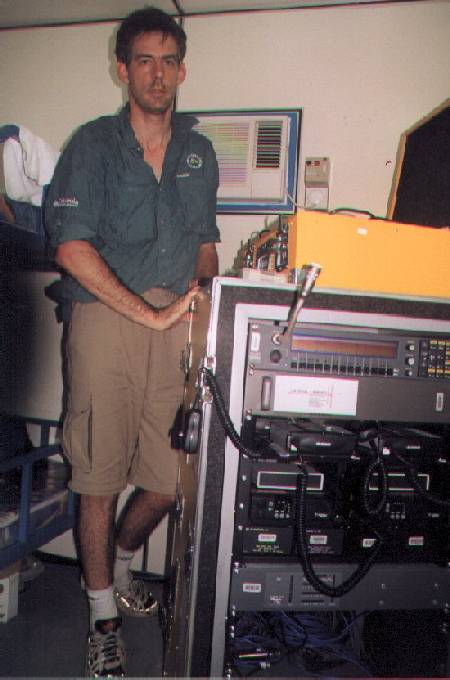
Paul with some of the radio equipment at Silam.
He is standing next to the HQ matrix, which contained all the communications equipment for headquarters.
Paul is also standing next to the only 2 beds in the HQ building. These were used by the radio operators to nap in between shifts.
Below, you see me sitting in the catering tent at Silam.
I think it must have been a good day, to have been sitting there, smiling... I am just guessing here, because obviously I did not take the photo, and I cannot remerber the place.
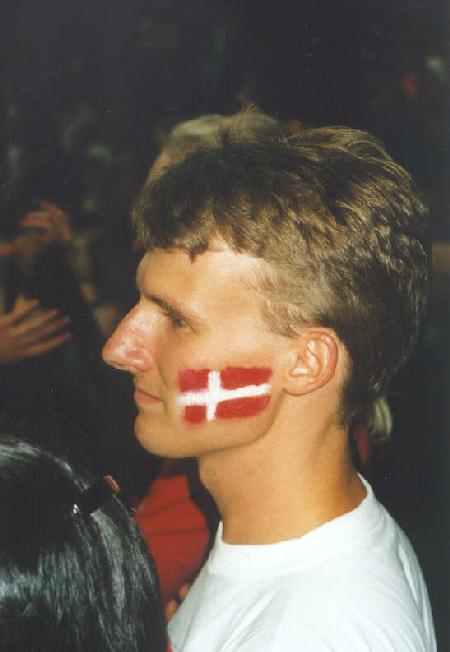
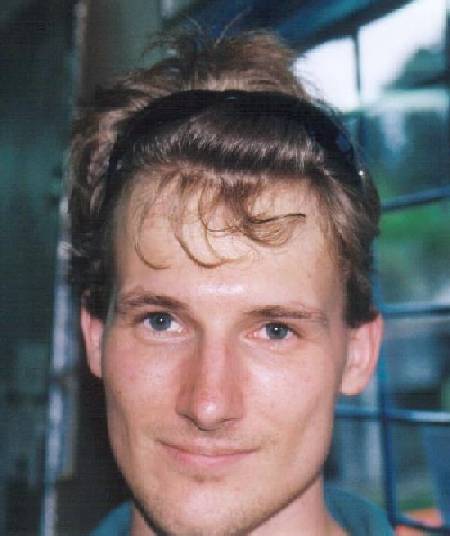
Bad hair day?
I did not have a shower for a very long time, and to hold my hair in place, I adopted various techniques, such as the sunglasses-hairband...
This place is a breathing ground for tropical diseases!
As you can see, my right eye is really red. I somehow managed to get conjunctivitis and did not know it was contagious. I did not want to trouble the medics as they were pretty tied up with the competitors. When my vision on the left eye was getting blurry and I had problems seeing what was in front of me, I was ordered to get it checked. Just as well I did!
In Kota Kinabalu, I had the same problem on the other eye... at one point both my eyes were infected. It started on my left eye on the way to Kota Kinabalu in the plane ! It then spread to my right eye. The nurse at Silam told me that I should be careful because it could re-infect to my left eye. It started to look and feel a lot better after using the eyedrops that they gave me.
Back to TopReturn to Borneo Homepage
Created: 7 Dec 2001
15. August 2000 10:39
by Rene Pallesen
0 Comments
Ecochallenge ( Sabah 2000 )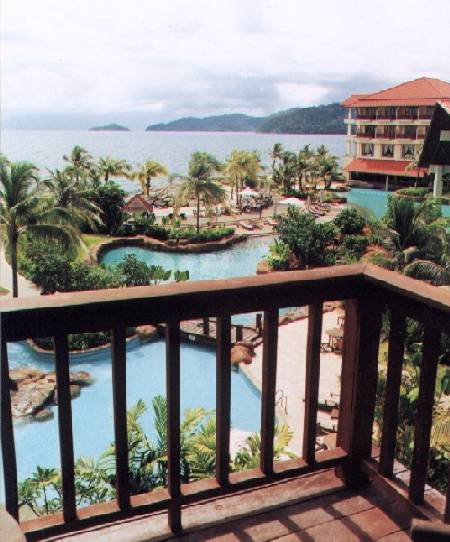 Preparations at the Magellan Hotel
Preparations at the Magellan Hotel
( Kota Kinabalu ) . . .All the Ecochallenge teams gathered together at the Magellan Hotel in anticipation of the race, which was due to start on 20th August.
During our stay at Kota Kinabalu, we were staying at the most extravagant hotel - as pictured on the right. It is huge! It has 3 swimming pools, and takes us an hour to walk around the perimeter.
The radio communications team had to arrive a few days before the start of the race because we had to hand out over 2,000 pieces of radio equipment. We had problems getting the necessary approvals for helicopters so I ended up having to hand out most of the equipment whilst Glen and Paul sorted out the issue of the helicopters. We had to get all the equipment and our team to Silam before the the race started.
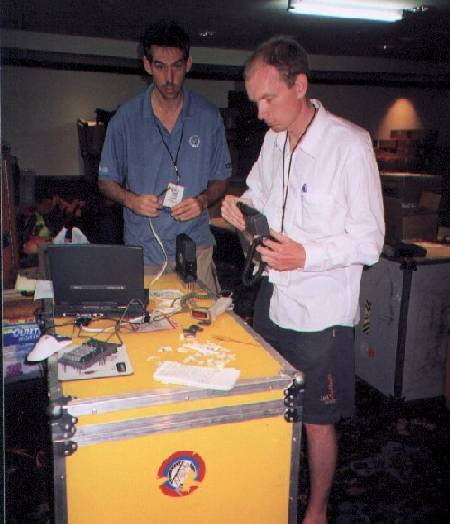
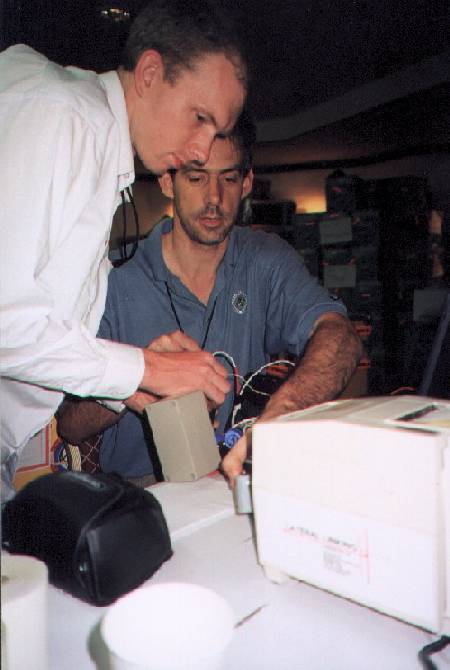
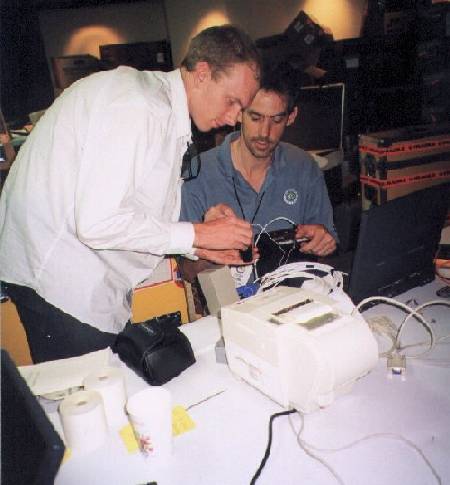 Glen and Paul checking all the equipment and re-programming some of the radios.
Glen and Paul checking all the equipment and re-programming some of the radios.
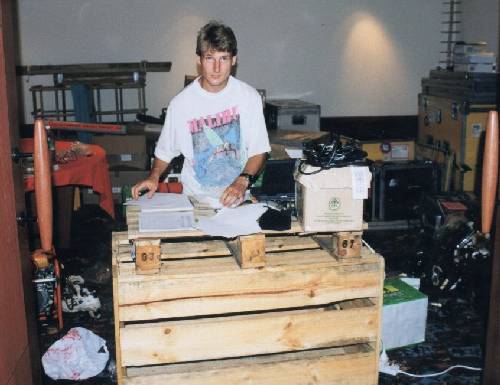
Behind me are all the radio equipment, ready to be handed out. I am standing here waiting for the competitors to arrive as I have to sign out the equipment as I give them out.
We had to improvise a lot of the furniture, using old crates to set up tables.
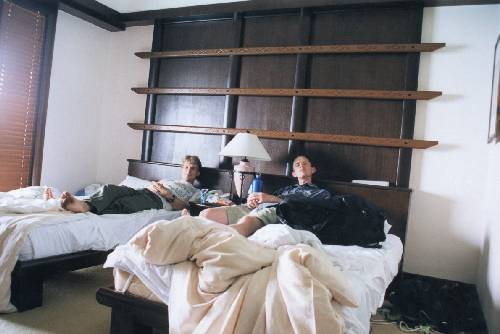
After the race, Glen and I decided to make most of the luxury and just veg... aaahhh... bliss!

Created: 7 Dec 2001
15. August 2000 10:39
by Rene Pallesen
0 Comments
Ecochallenge ( Sabah 2000 )
Ecochallenge in 2000 was held on the east coast of Borneo, in the jungles of Sabah. It was an extreme race where the competitors taking part have to endure 10 days of running through the jungles; kayaking and swimming many kilometres offshore; and mountain-biking for 150km on dirt roads. All in all, the fastest competitors travelled 600km in a space of just over 5 days!
I had the privilege of being there, being the developer of software that was used by the radio communications team. I also helped out with the setting up of all equipment and made many trips to the repeater stations.
Being in the jungles of Sabah, let alone part of the Ecochallenge preparations, has proved to be a challenge and an experience worth remembering, and hope to be part of any future Ecochallenge events.
As shown in the map, the red trails are where most of the competitors either ran or walked. The purple trail was the kayaking/canoeing leg. The orange trail was the mountain-bike leg and the blue trail was where the competitors had to swim with all their equipment.
Back to TopReturn to Contents page
Created: 7 Dec 2001